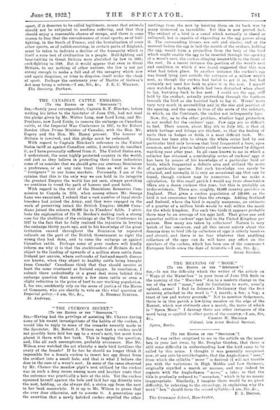THE CANADIAN CATTLE EMBARGO.
fTo THE EDITOR 01 THE " SPECTATOR."] Ste,—Surely your correspondent, Captain R. F. Hinckes, before writing his letter to the Spectator of June 17th, had not read the pledge given by Mr. Walter Long, now Lord Long, and Mr. Prothero, now Lord Ernle, to remove the embargo on Canadian cattle, at the Imperial War Conference in 1917, to Sir Robert Borden (then Prime Minister of Canada), with the Hon. Mr. Rogers and the Hon. Mr. Hazen present. The honour of Britain is involved, and this pledge must be redeemed.
With regard to Captain Hinckes's reference to the United States tariff as against Canadian cattle, I certainly do recollect it, as I have personally suffered from it. The United States are, I understand, the most highly protected country in the world, and just as they believe in protecting their home industries some of us consider that we should give our overseas Dominions a preference, or at any rate treat them as well as we do " foreigners " in our home markets. Personally, I am of the opinion that this is the only way we can hold in its integrity the greatest Empire the world has yet seen, always providing we continue to tread the path of honour and good faith.
With regard to the visit of the Dominions Resources Com- mission to Canada in 1016, when among others Mr. George Lane was examined, I submit that a vast number of loyal stock- breeders had joined the Army, and they were engaged in the work of preserving intact the British Empire; 600,000 Cana- dians joined the colours, 60,000 lie in Flanders' fields. I attri- bute the explanation of Sir R.. Borden's making such a strong case for the abolition of the embargo at the War Conference in 1917 to the fact that he fully realized the injustice in levying the embargo thirty years ago, and to his knowledge of the great irritation caused throughout the Dominion by repeated refusals on the part of the British Government to right the wrong they had done, and to raise the embargo as against Canadian cattle. Perhaps some of your readers will kindly inform me why it is that the stockbreeders of Britain do not object to the landing of upwards of a million store cattle from Ireland per annum, where outbreaks of foot-and-mouth disease are known, when they object to healthy cattle being brought from Canada? Canadians think that they should receive at least the same treatment as Ireland enjoys. In conclusion, I submit there undoubtedly is a great deal more behind this embargo question than merely a few store cattle or even a slight reduction in the price of beef to our working population. I, for one, confidently rely on the sense of justice of the House of Commons, who are shortly to vote on this vital question of
Imperial policy.—I ant, Sir, &c., A. HERBERT ECKFOR D. St. Andrews.


































 Previous page
Previous page